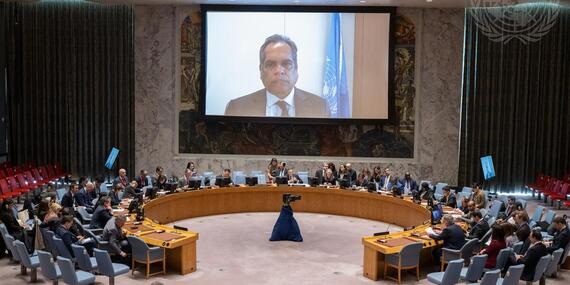Ukraine: War will continue to cause 'ripple effects around the world'

MR. RAMESH RAJASINGHAM, OCHA DIRECTOR OF COORDINATION, ON BEHALF OF UNDER-SECRETARY-GENERAL FOR HUMANITARIAN AFFAIRS AND EMERGENCY RELIEF COORDINATOR, MR. MARTIN GRIFFITHS
Briefing to the UN Security Council on humanitarian situation in Ukraine
6 December 2023
As prepared for delivery
Thank you, Mr. President.
As you have just heard from Assistant Secretary-General Jenča, civilians in Ukraine continue to pay a heavy price for this war.
If the brutal impact of more than 21 months of fighting since February 2022 were not enough, millions of children, women and men are now faced with the prospect of yet another winter of severe hardship amid the impact of increased attacks on hospitals, electricity transmission systems, and gas and water supplies.
The deaths, injuries and level of destruction of vital civilian infrastructure is staggering.
Many people have been left without access to heat, electricity, and water, particularly in the east and south.
Amid freezing temperatures, this damage is particularly threatening the survival of the most vulnerable – among them the elderly and those with disabilities – who are already suffering because of disruption to essential services caused by the war.
The situation is deeply concerning.
I must reiterate that international humanitarian law is very clear: attacks must never be directed against civilians or civilian objects and constant care must be taken to spare them at all times.
Mr. President,
The work of humanitarians is aimed at saving lives and safeguarding dignity in the midst of disaster and war.
This remains our steadfast objective in Ukraine.
So far in 2023, almost 560 humanitarian partners – the majority of them local organizations – have provided life-critical aid and protection services to more than 10 million people.
The commitment and endurance shown by these organisations in delivering this response is truly admirable – particularly now, as they work against the clock and the elements to support civilians with the services and supplies, they need to see them through the harsh winter.
In recent weeks, humanitarians have provided more than 361,000 people with some form of direct winter assistance, including winter heating, repair and maintenance of energy and heating systems and much-needed home repair materials.
Similar efforts continue in response to wider needs across all affected areas of Ukraine.
Last week, a landmark 100th interagency convoy for 2023 reached Chasiv Yar. Throughout the year, these convoys have provided critical assistance to almost 400,000 people in hard-hit front-line communities across oblasts from Kharkiv, to Donetsk, Zaporizhzhia, Dnipro, Kherson, and Sumy.
This support was substantially buttressed by deliveries from smaller individual organizations.
And they have taken place against the backdrop of significant obstacles: the lack of humanitarian access across the frontline in Donetsk, Luhansk, Kherson and Zaporizhzhia, remains the biggest challenge.
At this juncture, I must underscore that under international humanitarian law, humanitarian access must be allowed and facilitated for all civilians in need, no matter where they live.
Obstructions that leave civilians without the essentials to survive are contrary to international humanitarian law.
Another major concern for frontline communities is the presence of landmines and other unexploded ordnance, which are causing tragic avoidable casualties and significantly hindering community recovery.
Humanitarian mine action is critical to prevent further civilian casualties, especially among children.
Mr. President,
None of this vital humanitarian work would be possible without the incredible donor support to the Ukraine Humanitarian Response Plan, which has received $2.3 billion of the $3.9 billion required in 2023.
But the $1.6 billion shortfall is still substantial. It means civilians have been left without life-saving shelter; women, girls and boys face the risks of violence and exploitation; interruptions to lifesaving primary healthcare are putting people’s life in danger; civilians will not be able to protect or restore their food production and livelihoods, further affecting their food insecurity.
Continued financial support is critical to sustain humanitarian operations to the end of 2023, in to 2024, and as long as civilians endure the war’s terrible toll.
Mr. President,
Despite the continued attacks on ports and grain infrastructure highlighted by Assistant Secretary-General Jenča, exports from Ukraine’s Black Sea ports through the new corridors announced in August have steadily increased.
The UN estimates that some 7 million metric tons of commodities have been transported through these corridors, of which around 70 per cent are understood to be grains and other foodstuffs.
Taking into account other routes, the overall volume of foodstuffs exported from Ukraine last month was comparable to November of last year.
However, significant risks due to air strikes and sea mines remain, and Ukraine’s deep-sea ports continue to operate significantly below their potential capacity.
In an incident on 16 November, explosions rocked an outbound bulk carrier loaded with wheat. Thankfully the vessel was not badly damaged and was able to continue its journey.
High levels of agricultural exports from the Russian Federation continue, primarily via the Black Sea, with the Russian Agriculture Ministry reporting expectations of very large grain harvests in 2023.
Last month the Russian Federation also reported the transportation of a first tranche of a total of 200,000 metric tons of grain donations pledged to six African countries.
The FAO Food Price Index has continued to trend downwards, with drops in international cereal prices among the drivers of this.
But volatility persists and we continue to emphasize the imperative of ensuring that all sources of food exports are safely and sustainably connected to global supply chains.
The Secretary-General continues his active engagement in support of this.
Mr. President,
While Ukraine remains under attack and in a state of conflict, the conditions that are causing such devastation and misery, and the ripple effects around the world, will persist.
As we come to the end of 2023 and enter 2024, we must redouble our efforts to prevent further escalation in Ukraine.
Together you must do everything within your power to end this tragic war.
Thank you.
